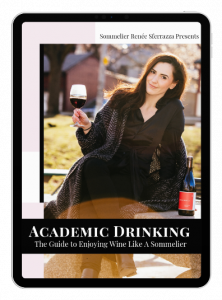Interview with Jenny Ratcliffe-Wright, Cape Wine Master

The revival of Pinotage continues! Jennifer Ratcliffe-Wright paints an engaging visual of Pinotage. The Cape Wine Master’s class showed a retrospective of the grape, communicating the passion she has for Cape region wines. Her class flowed through the history of Pinotage with ease, laying out all the details in an understandable way. Ratcliffe-Wright emanated an enthusiasm and love for this genuinely South African grape.
An invented grape, Pinotage is an intraspecific crossing of two Vitis Vinifera varieties, Pinot Noir and Cinsault. It was created in 1925 by Professor Abraham Perold, in the hopes that the new grape would be more resilient to the South African terroir while producing an elegant wine. However, it was not until the 1940s that commercial plantings of this grape started.
Since the 1980s, South Africa’s Cape region winemakers have made great strides to show the potential of this grape. Ratcliffe-Wright expressed, it takes a skilled winemaker to keep this unique grape in check and pull out its potential. Today’s Pinotage has finally shaken off its bad rap. Great productions have a range of flavours and aromas from ripe dark black fruits and red pepper, to hoisin, bacon and smoke.
Ratcliffe- Wright’s IWEG Canada Master Class on South African Pinotage poured wines from both boutique wineries and iconic big players. Featuring wines from Anthonij Rupert, B Vintners B, Diemersfontein, Black Elephant, Remhoogte, Neil Ellis, Kanonkop and Beyerskloof, leaving students with a gained understanding of this classic Cape region varietal.
Eight examples of Pinotage later, we sat down with Jenny Ratcliff Wright to find out a bit more.
What are three characteristics of South African wines that distinguish them from European wines?
“South African wines are generally known to be somewhere between the Old World and the New World. That is what people find attractive about them because they are neither, there own unique offering. I find that to be something quite special. For example, South African Sauvignon Blanc won’t be a very grassy New Zealand style, and it won’t be like the Bordeaux or the Loire style. It will be a tropical style and is somewhere in the middle, and I think that is a wonderful offering.
South Africa’s other great offerings it is biodiversity, and its efforts to protect its natural flora and fauna on its wine farms… encouraging the wine farmers to farm sustainably, with integrated management of pests as well as learning to farm harmoniously.
One more thing that is very specific to South African wine is that it is very diverse… there is diversity in South Africa in many ways. In South Africa, we have a range of climates. We’ve got cool climate, semi-desert, coastal, maritime, mountainous, and soils are different. Every region has something different to offer. What I am finding very interesting in South Africa is that the Winemakers and Viticulturalists and now learning to use that diversity and plant the right grapes in the right area to show a sense of place.”
What current projects in South African wine most excited you?
I’m personally excited about the preservation of old vineyards. Vineyards that were often left to ruin because the wine farm couldn’t afford to keep them up are now being regenerated. Some of them are 100 years old!
[Winemakers] are getting a little bit of fruit from these plants but concentrated, interesting wines. There are a couple of winemakers that are really spearheading this movement with real authenticity. I think in the world of wine where there is just so much commercial ‘drinking’ wine out there to have authenticity in the bottle is something exciting. A Viticulturist that is spearheading this in South Africa is Rosa Kruger. She is looking for these special parcels of interesting vineyards to rehabilitate completely, making truly special wines.
From your viewpoint, what do you think is the trajectory of South African Wines?
I think that is a three‐pronged answer. The lower end of the scale is what we call Critter Wines, wines with labels that have animals. We have no control over that side of the industry. Then there are the two higher‐end sides of the industry that I find wonderful. The first is the iconic South African wineries that have been producing amazing wine for 50 years and continue to
Strive for excellence. And then there are wonderful little pockets of boutique, garagiste, quirky, interesting, slightly odd wines, wineries and people that are not iconic. They don’t have any budgets; they’re just selling their wares and doing their wine the best that they can. They are producing something exceptional and bespoke. I think if South Africa were to hang its hat on those two pillars of iconic big wineries and small little dots of excellence, they would be doing well.”
Tell us about our favourite wine of the night, Black Elephant – Three Men in a Tub with a Rubber Duck.
How is the wine representative of Black Elephant as Vintners?
They are doing cool things. They are new on the scene; they are not beholden to the old rules.They are slightly bigger than the little garagiste we talk about, but… they have come on to the Scene saying, we are going to do some cool stuff and do it our way.
I love the fact that they have two old vineyards that they found to be spectacular and delivering great fruit, about 50Km apart. So, there is not much of it. They have taken their fruit, and they believe so strongly in their quality that they are not putting any new oak in it. They are not hiding behind anything; they are confident. I love that!
They are saying we have chosen great fruit, and many people say that great wine is made in the vineyard. [Black Elephant] is low intervention; they are not doing much with their grapes apart from some whole bunch fermentation. I think they did a real success job, and you can get their wine in Ontario!

